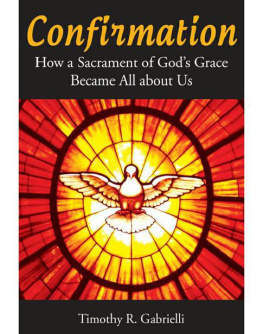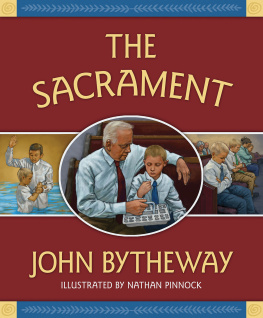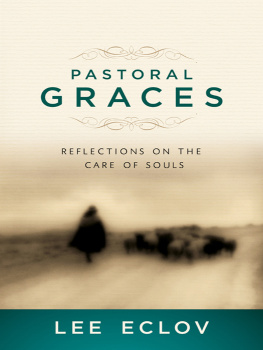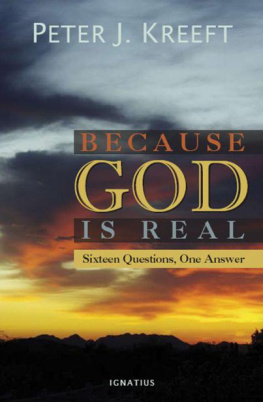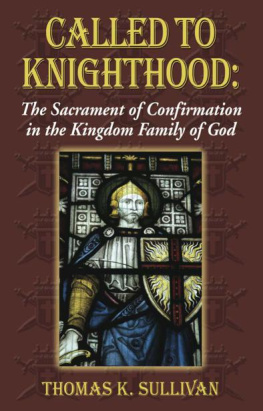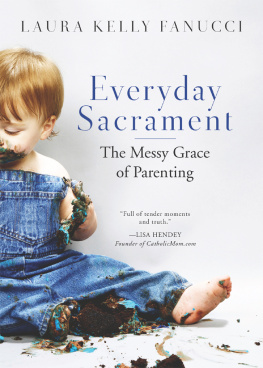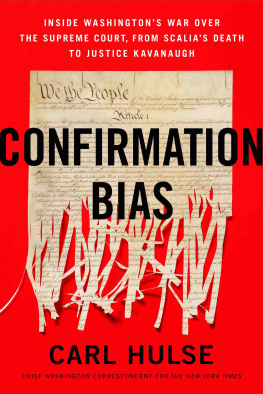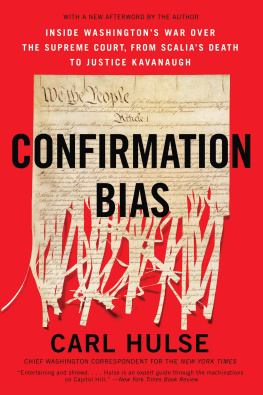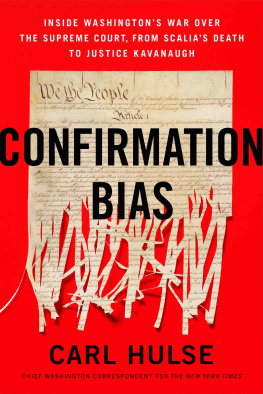A groundbreaking work about a sacrament that is important pastorally yet whose theology and practice are often debated, not to say controverted. The authors modest and respectful tone belie the brilliance and depth of this book. Both pastorally poignant and pertinent, this is a must read for pastoral ministers interested in deepening their appreciation of what is often a misunderstood sacrament.
Rev. Msgr. Kevin IrwinOrdinary Professor of Liturgical Studies and Sacramental TheologyThe Msgr. Walter J. Schmitz, S. S. Professor of Liturgical StudiesThe Catholic University of America
Timothy Gabriellis study of confirmation and U.S. culture in the twentieth century is a welcome addition to the literature on this sacrament in search of a theology. This book explains why we think about confirmation in the different ways that we do and it encourages those charged with preparing others for this sacrament always to keep in mind that the Catholic faith and its sacramental practices occur in a cultural context that always has an impact on how the Gospel is understood and lived. I highly recommend this book for religious educators or anyone who wants a deeper understanding of the interplay between culture and sacramental theology/practice.
Timothy BrunkAssociate Professor of TheologyVillanova University
Timothy Gabrielli jumps with both feet into the ongoing conversation about the meaning of Confirmation. He writes clearly and insightfully. As one who has participated actively in this conversation for several decades, I recommend this book to all who play a role in helping young Catholics to develop and deepen a relationship with the indwelling Person of the Holy Spirit.
Sister Kieran Sawyer, SSND Confirming Faith , Ave Maria Press
Anyone discussing confirmation must bring to the conversation hefty amounts of courage and wisdom, and Timothy Gabrielli does bring both. His survey of theological, psychological, charismatic, and humanist motifswhich, since Pius Xs 1910 Quam Singulari , have been used to explain the meaning of confirmationhighlights how different understandings of the sacrament have been influenced by the evolving relationship of Catholics to the American culture. Emphasizing that confirmation confers the gift of the Person of the Holy Spirit, Confirmation: How a Sacrament of Gods Grace Became All about Us is a worthy contribution to our study of the sacrament many consider still to be in search of a theology.
Fr. Kurt Stasiak, OSBProfessor of Sacramental-Liturgical TheologySaint Meinrad Seminary
Timothy Gabrielli is to be commended for having navigated with great balance and skill the complexities regarding the theology and practice of the Sacrament of Confirmation, positing his exploration within the increasingly diverse cultural reality that is the twenty-first century Church in North America. The historical, theological, and pastoral depth of this work, written in a clear and accessible style, will make this book a very useful resource for scholars and pastoral practitioners alike.
Keith F. Pecklers, S.J.Pontifical Gregorian UniversityPontifical Liturgical InstituteRome, Italy
Confirmation
How a Sacrament of Gods Grace Became All about Us
Timothy R. Gabrielli

LITURGICAL PRESS
Collegeville, Minnesota
www.litpress.org
Cover design by Marisa Antonello and TurnStyle Imaging. Photo: Window of a cathedral of St. Peter Hemera collection on Thinkstock. Excerpts from the English translation of the Rite of Confirmation (Second Edition) 1975, International Commision on English in the Liturgy Corporation (ICEL); excerpts from the English translation of Eucharistic Prayer II from The Roman Missal 2010, ICEL. All rights reserved. Excerpts from documents of the Second Vatican Council are from Vatican Council II: The Basic Sixteen Documents , by Austin Flannery, OP 1996 (Costello Publishing Company, Inc.). Used with permission. Excerpts from the English translation of the Catechism of the Catholic Church for use in the United States of America copyright 1994, United States Catholic Conference, Inc.Libreria Editrice Vaticana. English translation of the Catechism of the Catholic Church: Modifications from the Editio Typica copyright 1997, United States Catholic Conference, Inc.Libreria Editrice Vaticana. Used with Permission. Scripture texts in this work are taken from the New American Bible, revised edition 2010, 1991, 1986, 1970 Confraternity of Christian Doctrine, Washington, D.C. and are used by permission of the copyright owner. All rights reserved. No part of the New American Bible may be reproduced in any form without permission in writing from the copyright owner. 2013 by Order of Saint Benedict, Collegeville, Minnesota. All rights reserved. No part of this book may be reproduced in any form, by print, microfilm, microfiche, mechanical recording, photocopying, translation, or by any other means, known or yet unknown, for any purpose except brief quotations in reviews, without the previous written permission of Liturgical Press, Saint Johns Abbey, PO Box 7500, Collegeville, Minnesota 56321-7500. Printed in the United States of America. The Library of Congress has cataloged the printed edition as follows: Library of Congress Cataloging-in-Publication Data Gabrielli, Timothy R., 1982 Confirmation : how a sacrament of Gods grace became all about us / by Timothy Gabrielli. pages cm Includes bibliographical references. ISBN 978-0-8146-3522-3 ISBN 978-0-8146-3547-6 (ebook) 1. ConfirmationCatholic ChurchHistory20th century. 2. Catholic ChurchUnited StatesHistory20th century. I. Title. BX2210.G33 2013 265.2dc23
2013018361
Dedicated to
My mother, Amy Gabrielli (19551998),
who saw to it that I was formed in the womb of the church
&
To my daughters, Sofia and Lidia Gabrielli,
may you be continually formed in its womb
Contents
Foreword
Confirmation, according to a classic strain of Catholic tradition, is the sacrament that both signifies and effects a grace-filled strengthening by the Holy Spirit.
Tim Gabrielli has written a book that explores the meaning and practice of this sacrament in twentieth-century United States as well as today. Such an exploration, Gabrielli explains, requires also a simultaneous exploration of how Catholics have experienced the relationship between their faith and the U.S. culture. One cannot understand the first without simultaneously understanding the second. Gabrielli articulates a sophisticated but accessible narrative as he analyzes various catechetical and liturgical approaches to what some have called the sacrament of choice and what others have called the sacrament of exit.
Is the book primarily a history? Is it primarily a systematic theology? Is it primarily a guide for thought for pastoral ministers? Yes. Yes. And Yes.
Gabrielli belongs to a generation of young Catholic theologians who want to get beyond various divisions and to offer intellectual support for the everyday living of the faith. He transcends these divisions not by ignoring them but by understanding them within their own historical context. His book offers an integrated vision of the history, theology, and practice of confirmation. He approaches his subject descriptively and even-handedly, though he also issues clear criticisms as he points to the strengths and weaknesses of a wide variety of positions.
Paradoxically, confirmation had become the sacrament of engagement with the world before that famous council made engagement with the world a key Catholic theme. Paradoxically, a strong focus on engagement with the world has encountered the danger of becoming swallowed up in a culture that somehow manages to overvalue (or perhaps to improperly define) the extremely valuable human capacity for individuality and autonomy. In the end, concerning questions such as the most proper mode of theological understanding for confirmation, or the appropriate age of reception, or the ordering within the sacraments, Gabrielli does not offer one fixed position that would simply take its place along the spectrum of warring factions. Instead, he offers wisdom designed to lead us beyond the polarized camps as we struggle to live out the meaning of the sacraments.
Next page
